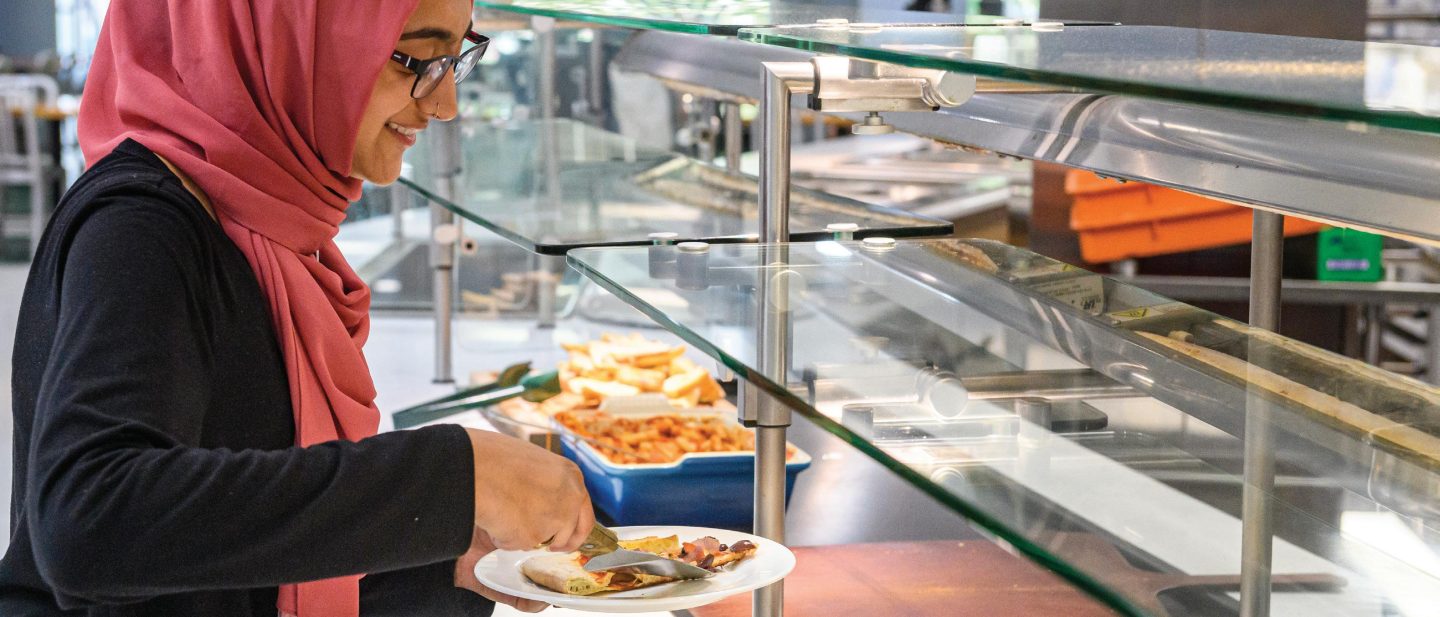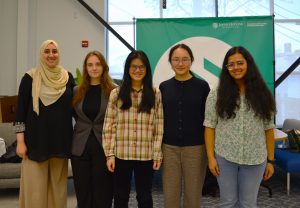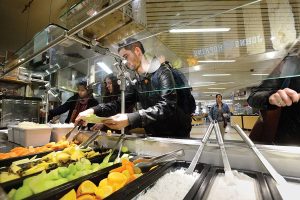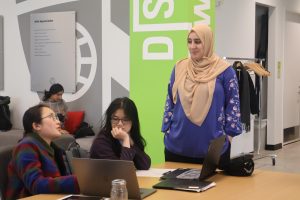
 Managing campus food waste is a key focus of JHU’s sustainability efforts, with initiatives like Weigh Your Waste, Free Food Alert, and Food Scrap Drop Offs aiming to foster responsible practices on campus. Campus as a Living Lab program awarded funding to a team in the Multidisciplinary Engineering Design course in the Whiting School of Engineering aiming to supplement these efforts by automatically measuring food waste in campus dining halls to improve campus dining menus and reduce food waste Led by instructor Nusaybah Abu-Mulaweh, the team consists of one Biomedical Engineering major, Hermione Cordeiro Larkin, and two Chemical and Biomolecular Engineering majors, Sunny Li and Megan Lim.
Managing campus food waste is a key focus of JHU’s sustainability efforts, with initiatives like Weigh Your Waste, Free Food Alert, and Food Scrap Drop Offs aiming to foster responsible practices on campus. Campus as a Living Lab program awarded funding to a team in the Multidisciplinary Engineering Design course in the Whiting School of Engineering aiming to supplement these efforts by automatically measuring food waste in campus dining halls to improve campus dining menus and reduce food waste Led by instructor Nusaybah Abu-Mulaweh, the team consists of one Biomedical Engineering major, Hermione Cordeiro Larkin, and two Chemical and Biomolecular Engineering majors, Sunny Li and Megan Lim.
The Multidisciplinary Engineering Design course is a 2-semester, hands-on learning experience in which teams of undergraduate engineers across disciplines collaborate on design challenges with project partners to understand a problem, ideate solutions, prototype & test concepts, and iterate on their designs.
To better understand campus food waste issues, the student team has been conducting surveys with students, interviewing Hopkins Dining staff, and exploring how food waste is measured at other campuses.
How might the projects’ findings inspire sustainable innovation on campus?
JHU is working to reduce the food waste seen in meal preparation as well as leftover waste from students. By identifying opportunities to reduce food waste from student meals, Hopkins can reduce waste by ordering the right foods and less food overall.
Developing an automated way to continuously weigh and analyze the student food waste after meal can help the Hopkins Dining team to:
- visualize time-series data to see how much food students are throwing out
- evaluate the efficacy of their waste reduction initiatives by analyzing waste weight over time
Abu-Mulaweh hopes the team will raise awareness among students and faculty on food waste by communicating tangible insights on the impacts of individual choices. The team’s ideas for achieving this include a food review platform for students to share their feedback on the menu items they try in dining halls and informative signage in dining halls.
“I hope that other students are inspired to pursue projects like these. They don’t have to go far to make a meaningful impact, and there are plenty of challenges here on campus that we can work on.” said Abu-Mulaweh.
Reducing food waste on campus: challenges & opportunities
We also spoke with the student team leader Hermione Cordeiro Larkin about the process of developing solutions to the food waste issue.
The team seeks to explore why food goes to waste, in particular after students fill their plates. Which recipes are popular with students, and why do some end up in the compost bin at the end of the meal instead of students’ stomachs?
Reducing food waste can help conserve the many resources that go into growing, processing, and transporting ingredients, as well as the staff time that goes into preparing the food. Additionally, after food waste gets tossed, it decomposes releasing potent greenhouse gases.
The team has explored why dining hall food goes to waste and how to ensure food is better enjoyed by students. Ultimately the students decided to develop software for data collection and visualization that can be integrated with existing hardware systems. The team aims to design a system that weighs food mass to identify how much waste is generated after student’s meals.
Hopkins Dining’s Weigh Your Waste campaign utilizes staff and volunteers to encourage students to weigh their leftovers at the end of their meal, providing visibility around sustainable dining choices and high-level information on waste quantities. The project is expanding that effort by automating consistent data collection that can inform day to day operations.
In her future career in teaching, Hermione plans to use her experience with this project to incorporate sustainability into real-world applications and examples for students.
How can the project address broader sustainability challenges beyond campus? 
Acknowledging a broader effort to reduce food waste beyond campus, Abu-Mulaweh suggests that the team’s solution, assessed on the campus as a testbed, could be applicable to broader sustainability challenges beyond campus.
“Having this data-driven approach means that we can scale this to support initiatives in other institutions, businesses and communities” said Abu-Mulaweh.

